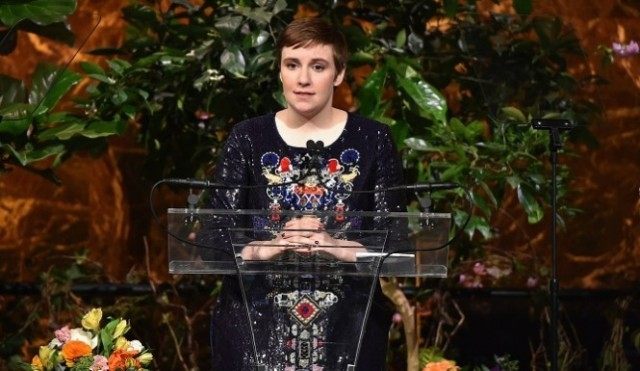Although she falsely accused a man of raping her, and refuses to protect other women by filing charges against her rapist, Lena Dunham was still honored by Variety as a sexual assault role model over the weekend. During her speech, Dunham opened things by attacking music that she claims “celebrates the exploiters and hides the exploited.”
—
—
Two wildly popular hip-hop songs were singled out by Dunham, Jay-Z’s 2000 hit “Big Pimpin’” and Three 6 Mafia’s Oscar-winning 2005 song, “It’s Hard Out Here for a Pimp.”
Dunham didn’t explicitly call for this kind of music to be banned. She didn’t have the courage to come out and do that. Instead she tried to achieve that goal by attacking the music and these artists as though their words were as dangerous as acts:
Here’s the tricky thing about language: it lies about how powerful it is. … [These songs] silenced and shamed the women they purported to described, and they reduced them to objects, or worse, punch-lines. They celebrated the exploiters and they hid the exploited.
Please.
Dunham claims to be an artist, and an edgy one, but in her privileged white upbringing the fact that most musical artists, including hip-hop artists, assume the role of characters in their songs appears to be lost on her. Bruce Springsteen never “got Mary pregnant” or a “job working construction for the Johnstown Company.” Tom Petty really isn’t a “bad boy, ’cause [he] don’t even miss her.”
Just like Dunham does on her low-rated HBO show “Girls,” Jay-Z and Three 6 Mafia are creating and speaking through characters. The two pimp songs Dunham so strongly disapproves of are artistic works in the voice of specific characters. It is shameful and ignorant to attack these songs as “silencers of women.”
I don’t know much about Jay-Z, but “It’s Hard Here for a Pimp” deserves a wider context than Dunham’s ignorant, anti-womyn attack. The song comes from the 2005 film “Hustle & Flow,” which in no way romanticizes anything about the pimp lifestyle. The story centers on a low-level pimp (played brilliantly by Terence Howard) who overcomes his circumstance, and the worst things about himself (including misogyny), through his art.
If Dunham looked at the song’s full lyrics, she’d see there’s something deeper and more meaningful than what her fascist feminist blinders allow her to see.
Rather than look at the full context of the experience of that character, Dunham is aiming to silence this character through a Tipper Gore-style shaming campaign.
That’s the opposite of liberal.
And how rich that the same Lena Dunham who gave us this, and attempted to normalize her creepy sexual behavior towards her much younger sister, is now logging public protests that are obviously meant to try and limit the artistic expression of those who offend her myopic, white, privileged, feminist worldview.
For the record, I’m not blinded to the detrimental effects some rap music has had on our culture, anymore than I’m blinded to what the disgraced and dishonest Lena Dunham has done to damage our culture. The lesser of two evils in this situation, however, isn’t even close. The only thing worse than the fallout brought on by unbridled artistic expression is what would happen if we were to start censoring one another.
Nothing in Jay-Z’s “Big Pimpin'” is anywhere near as offensive or dangerous as Lena Dunham telling him his word commit an act of “silencing and shaming” victims, which we all know is just a cowardly way of saying “shut up.”
This is why I don’t mock Madonna. I’ll take a hundred Madonnas over any one of these modern-day, censorious, killjoy feminists.
Follow John Nolte on Twitter @NolteNC

COMMENTS
Please let us know if you're having issues with commenting.